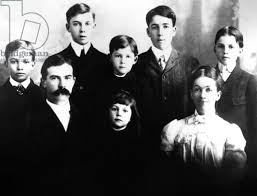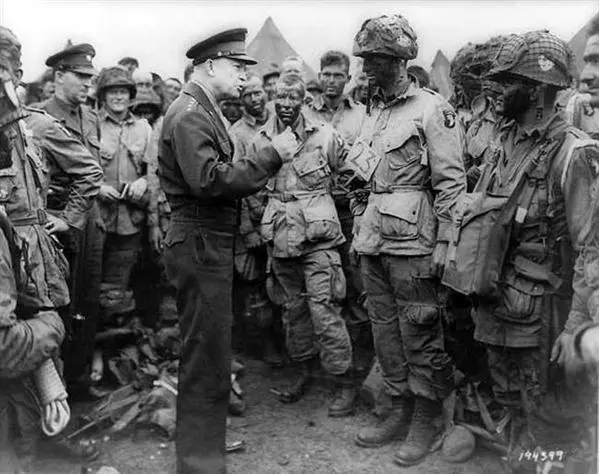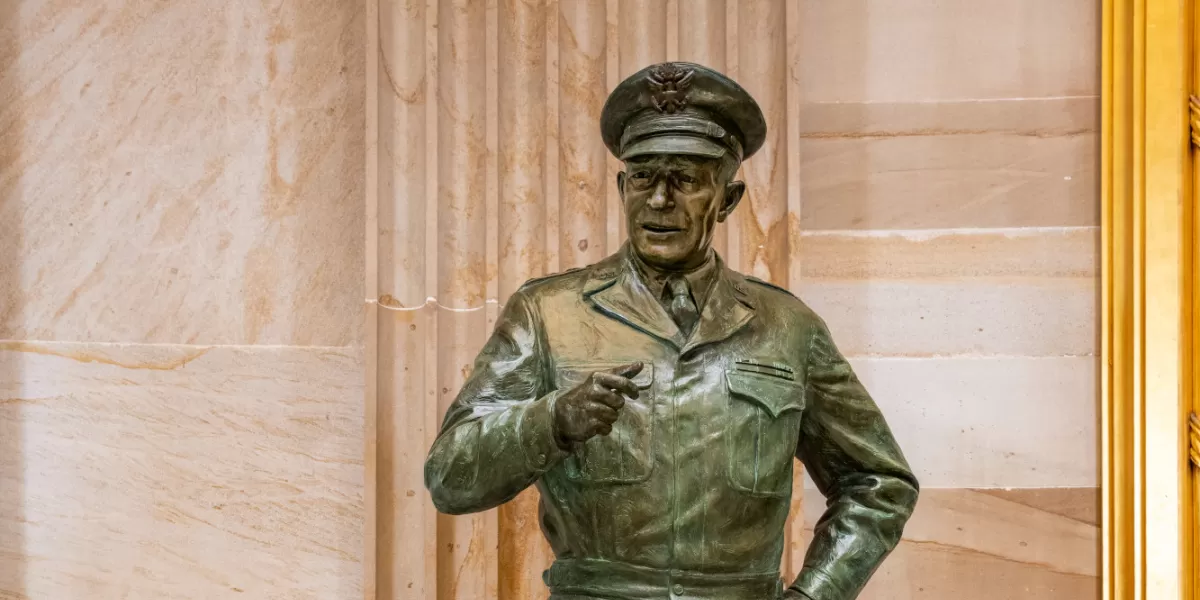Dwight D. Eisenhower: The Man Who Changed the Course of History
The Kansas Boy Who Conquered the World
In the small town of Denison, Texas, Dwight David Eisenhower was born on October 14, 1890, destined to become one of the most influential men of the 20th century. But no one would have ever imagined that that child, raised in a modest family in Kansas, would one day hold the fate of Europe and the United States in his hands.
The story of "Ike" - as everyone called it - is one of those narratives that seems to come out of an epic novel: from the son of a railroad worker struggling to make ends meet, to the general who led the largest amphibious invasion in history, until he became the president who would define post-war America.

The Years of Formation: West Point and the Forging of a Leader
The son of a modest rural Kansas family, Eisenhower received a religious and disciplined education. The turning point of his life came when he studied at the West Point military academy, where he entered as a becarius thanks to his brilliant qualifications in 1911.
West Point wasn't just a military school: it was a melting pot where characters were forged. Eisenhower learned there not only military tactics, but above all that leadership ability that would distinguish him throughout his life. His classmates remembered him as a determined young man, with an infectious smile and an extraordinary ability to bring together people of different opinions.
After graduating in 1915, he was assigned to organizational and office functions, thus beginning a career that would take him through two world wars and beyond.
The Man Behind the Uniform: Family and Values
In 1916, Eisenhower's life took a turning point when he married Mamie Geneva Doud, on July 1, 1916, in Colorado. Mamie wasn't just the wife of a soldier: she was the companion of a life dedicated to service. They had two sons: Doud Dwight Eisenhower (1917 - 1921) and John David Sheldon Doud Eisenhower (1922 - 2013).
The loss of his first child, Doud, at the age of just three to scarlet fever, profoundly affected Eisenhower. Those who knew him well say that from that moment he developed an even deeper understanding of human pain, a sensitivity that would help him guide men in the most difficult moments of war.
Mamie became his point of reference, the anchor that held him steady during the storms of history. In his private letters, Eisenhower affectionately called her "my rock", and she supported him from the rear as he made decisions that would change the world.
The Second World War: The Moment of Truth
As Europe sank into the abyss of war, Eisenhower stood out for his organizational and strategic skills. But it was his appointment as supreme commander of Allied forces in Western Europe that catapulted him into history.
Imagine the pressure: coordinate the armies of different nations, with distinct military cultures, different languages, and often with equally different egos among commanders. Churchill, de Gaulle, Montgomery, Patton - all great personalities, all with their visions. Eisenhower had to be a diplomat and a general, a psychologist and a strategist, all at the same time.
D-Day: The Decision That Changed History
June 6, 1944 is a date imprinted in the history of humanity: it is D-Day, when the Allied forces landed on the coast of Normandy, starting Operation Overlord. But few know that behind that date there was a man who carried on his shoulders the weight of a decision that could have changed the course of the war.
On the night of June 5, Eisenhower walked nervously in his tent. The weather forecast was uncertain, the Germans were strengthening, and 150,000 Allied soldiers were waiting for his order. The D-Day invasion was the largest amphibious attack in history, and it all depended on his decision.
At 4:15 am on June 6, after hours of consultations with meteorologists, Eisenhower uttered the words that would change history: "Okay, let's go.". During D-day, on 6 June 1944, an amphibious operation by the Allies took place, during which 135,000 soldiers landed on the beaches of Normandy.
But Eisenhower was so aware of what was at stake that he had already prepared a message to spread in case of failure, in which he fully took responsibility for the disaster. Fortunately, that message was never sent.

The Presidency: From War to Peace
After the war, Eisenhower could rest on his laurels. Instead, in 1952 he decided to run for president with the slogan "I like Ike", which was irresistible. Dwight Eisenhower won by a wide margin over his opponent, Democrat Adlai Stevenson, he became President in 1953 and held the position until 1961.
As president, Eisenhower faced challenges completely different from military ones. As president, he presided over a period marked by economic prosperity and conformity in the midst of the Cold War. His presidency was a period of economic growth and stability, but also of international tensions with the Soviet Union.
Eisenhower's Philosophy: More than a Matrix
It is around this time that Eisenhower developed that famous distinction between urgent and important that would become the "Eisenhower Matrix". But for him it wasn't just a time management tool: it was a philosophy of life.
"I have two kinds of problems", he said during a 1954 speech, "the urgent ones and the important ones. Urgent are not important, and important are never urgent'.
This phrase encapsulated the wisdom of a man who had learned to distinguish between the clamor of the moment and the decisions that really matter.
During his presidency, as the world agitated over the crises of the day, Eisenhower invested time in long-term planning: the interstate highway system, the expansion of education, NASA. Decisions that seemed less urgent than daily crises, but which shaped America for decades to come.
The Leadership Style: Lessons from a Master
What made Eisenhower so effective as a leader? Those who worked with him tell of a man who had the rare gift of making every person feel important. It didn't matter if you were talking to a general or a private: Eisenhower listened to you with the same attention.
La sua leadership si basa su alcuni principi fondamentali:
The Meticulous Preparation: Eisenhower never left anything to chance. Before every important decision, he consulted experts, studied the data, considered all the variables. But then, when it was time to decide, he did it decisively.
The Art of Compromise: In a world of ego and ambition, Eisenhower had the extraordinary ability to converge different visions towards a common goal. It wasn't weakness, it was diplomatic genius.
Personal Responsibility: Whether it was for D-Day or presidential decisions, Eisenhower always took full responsibility. He shared successes, he carried failures on his shoulders.
Humanity: Behind the determination was a profoundly human man, who never forgot that his decisions had consequences on the lives of real people.
The Years of Retirement: The Wisdom of Experience
Eisenhower died on March 28, 1969, in Washington, leaving behind a legacy that goes far beyond military and political achievements. His last years were dedicated to writing memoirs and reflecting on his extraordinary life.
In his memoirs, Eisenhower wrote, "Leadership is about getting someone to do what you want because they want to do it.". It was the synthesis of a life dedicated to guiding others, not through strength or authority, but through inspiration and example.
The Legacy of a Great Man
Today, when we think of Eisenhower, we often come up with his time management matrix. But that instrument is just a small reflection of an extraordinary mind that has been able to distinguish between what screams loudest and what really matters.
Eisenhower taught us that true leadership is not about making easy decisions, but about having the courage to make the right choices even when they are difficult. He showed us that you can be determined without being authoritarian, strong without being rigid, leaders without forgetting to be human.
In an age where we are bombarded with artificial urgencies and immediate pressures, Eisenhower's lesson is more relevant than ever: focus on what is truly important, plan for the future, and not be distracted by the noise of the moment.
His life reminds us that behind every great decision in history there is always a person who had the courage to make it. And what sometimes, the boy from Kansas can really change the world.

Conclusion: A Model for Today
Dwight D. Eisenhower was not just a general or president: he was an example of how humility, preparation and determination can transform an ordinary person into an extraordinary leader. His ability to distinguish between urgent and important was not only a time management technique, but a philosophy of life that allowed him to make decisions that still influence the world today.
In an age of quick decisions and immediate reactions, Eisenhower reminds us of the value of reflection, planning and long-term thinking. His example continues to be a guide for anyone facing important responsibilities, reminding us that true leadership begins with the ability to see beyond the immediate and invest in what really matters.
His story teaches us that no matter where you come from or how humble your origins are: with determination, preparation and a clear vision of what is important, you can leave an indelible mark on history.